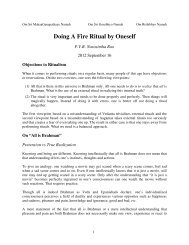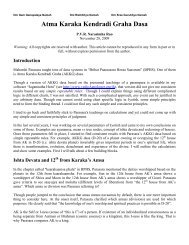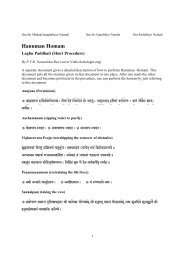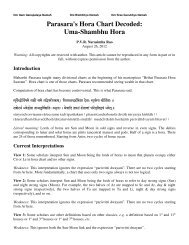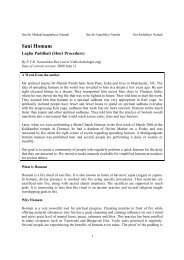The Glory of the Goddess-Devi Mahatmyam
The Glory of the Goddess-Devi Mahatmyam
The Glory of the Goddess-Devi Mahatmyam
You also want an ePaper? Increase the reach of your titles
YUMPU automatically turns print PDFs into web optimized ePapers that Google loves.
Chapter 4<br />
When <strong>the</strong> most valiant and wicked Asura and his armies were slain by <strong>the</strong> <strong>Goddess</strong>, <strong>the</strong> hosts<br />
<strong>of</strong> gods headed by Indra lauded her, <strong>the</strong>ir necks and shoulders reverently bent, and bodies<br />
rendered beautiful with horripilation and exultation.<br />
This is <strong>the</strong> longest and most eloquent <strong>of</strong> <strong>the</strong> <strong>Devi</strong> <strong>Mahatmyam</strong>’s four hymns. Known as <strong>the</strong><br />
Shakradistuti (praise by Indra and <strong>the</strong> host <strong>of</strong> gods), it illumines <strong>the</strong> <strong>the</strong>mes <strong>of</strong> good and evil,<br />
fate and free will, karma and divine grace. This hymn constitutes <strong>the</strong> fourth chapter <strong>of</strong> <strong>the</strong><br />
<strong>Devi</strong> <strong>Mahatmyam</strong>. <strong>The</strong> hymn praises Durga as “good fortune in <strong>the</strong> dwellings <strong>of</strong> <strong>the</strong> virtuous<br />
and misfortune in <strong>the</strong> abodes <strong>of</strong> <strong>the</strong> wicked.” While this verse explicitly entails reward and<br />
punishment by a personal deity, implicitly it points to an impersonal balancing principle at<br />
work in <strong>the</strong> universe- <strong>the</strong> law <strong>of</strong> karma. Ei<strong>the</strong>r ways <strong>the</strong> message is <strong>the</strong> same: our deeds have<br />
consequences. <strong>The</strong> hymn fur<strong>the</strong>r proclaims that <strong>the</strong> Mo<strong>the</strong>r’s intentions are most gracious<br />
even toward evildoers. Her nature is to subdue <strong>the</strong> misconduct <strong>of</strong> <strong>the</strong> wicked. Through her<br />
inconceivable grace, even wrongdoers who have committed great evils that may well ensure<br />
<strong>the</strong>m <strong>of</strong> long torments for <strong>the</strong>ir evil deeds are purified in battle by <strong>the</strong> touch <strong>of</strong> her weapons<br />
and are brought to beatitude. In destroying <strong>the</strong> demons <strong>the</strong> <strong>Goddess</strong> destroys <strong>the</strong> evil<br />
samskaras within us.<br />
Thus <strong>the</strong> supporter <strong>of</strong> <strong>the</strong> worlds was praised and worshipped with celestial flowers,<br />
perfumes, unguents and heavenly incense by <strong>the</strong> devas. Benignly serene in countenance she<br />
spoke to <strong>the</strong> obeisant gods. <strong>The</strong> <strong>Devi</strong> said, “O devas, choose whatever you desire <strong>of</strong> me”. <strong>The</strong><br />
gods responded, “Since our enemy, this Mahishasura, has been slain by you, O Bhagavati<br />
everything has been accomplished, and nothing remains to be done. And if a boon is to be<br />
granted to us by you, O Maheshvari, whenever we think <strong>of</strong> you again, please destroy our<br />
direct calamities. And, O Mo<strong>the</strong>r <strong>of</strong> spotless countenance, whatever mortal shall praise you<br />
with <strong>the</strong>se hymns, may you, who have become gracious towards us, also be gracious to him<br />
and bless him to be fortunate, O Ambika!” <strong>Goddess</strong> Bhadrakali who was thus propitiated by<br />
<strong>the</strong> gods for <strong>the</strong>ir own sake and that <strong>of</strong> <strong>the</strong> world, said “Be it so” and vanished from <strong>the</strong>ir<br />
sight.<br />
Thus ends <strong>the</strong> fourth chapter -‘<strong>The</strong> <strong>Devi</strong> Stuti’- <strong>of</strong> <strong>the</strong> <strong>Devi</strong>-Mahatmya in Markandeya-<br />
Purana.<br />
Final episode (Uttama Caritra) - Chapters 5 to 13<br />
In <strong>the</strong> final episode referred to as <strong>the</strong> uttama caritra, sage Medhas narrates <strong>the</strong> story <strong>of</strong> <strong>the</strong><br />
demons Shumbha and Nishumbha. This time <strong>the</strong> cast <strong>of</strong> characters is much larger and <strong>the</strong><br />
metaphorical significance is subtle but not difficult to comprehend. This story too has a<br />
familiar beginning.<br />
16



